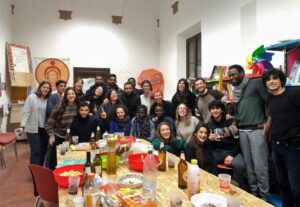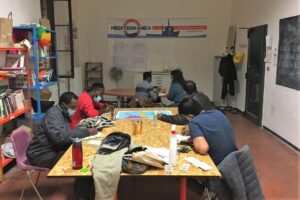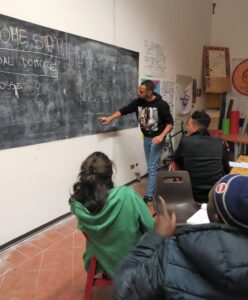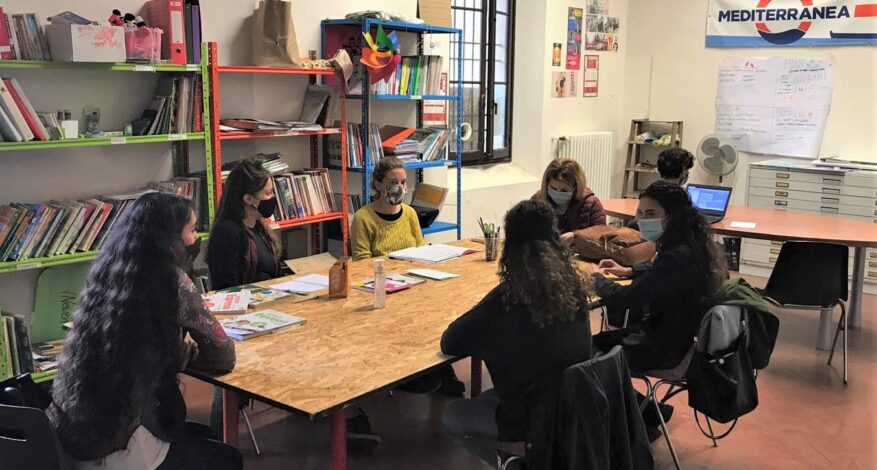LABAS ITALIAN LANGUAGE SCHOOL
Since 2017, Vicolo Bolognetti 2, in Bologna, has been the home of Làbas, a well-known community centre in the city, which houses several projects: after-school for children, work desk, legal desk, music workshop, bicycle workshop, Italian school, and many others. In this article, we will focus on the Italian language school Newén and the differences between it and the other Italian schools.
Làbas and Accoglienza Degna, spaces of inclusion
 The community centre Làbas was created in 2012 from the occupation of the ex Masini barracks, a large building in Via Orfeo, with the aim of giving life to abandoned spaces and giving them back to the community. The community centre hosted the project Accoglienza Degna, one of the first experiences of alternative migrant hospitality, in which was born the Italian language school Newén.
The community centre Làbas was created in 2012 from the occupation of the ex Masini barracks, a large building in Via Orfeo, with the aim of giving life to abandoned spaces and giving them back to the community. The community centre hosted the project Accoglienza Degna, one of the first experiences of alternative migrant hospitality, in which was born the Italian language school Newén.
Many things have changed in recent years: in 2017 the ex Masini Barracks were evacuated and Làbas moved to Vicolo Bolognetti. The location has changed, but not the purposes of the Centre, which has remained a space for activism, discussion, and reflection, for the practice of horizontal democracy and inclusion. In this perspective of aims the Italian language school was born, as an instrument of self-determination and participation in city life.
The Newén school: a mutual exchange of knowledge
In the school, the classic power relationship between teacher and student is dismantled. As the teacher/student distinction can be problematic, the Italophone/non-Italophone distinction is adopted. This is not a formality, but a real declaration of intent. Within the class not only the non-Italophones are learning, but also the Italophones: it is a mutual exchange of knowledge, culture, and experience.
Heterogenous classrooms and flexible approaches
 The school is divided into two classes, the female class, and the mixed class, composed of both men and women. Many women would not attend lessons if there were men, some of them for religious and cultural reasons, and others for personal reasons. The separation is due to the need to create an environment that is as welcoming as possible, where people who attend school feel free and safe.
The school is divided into two classes, the female class, and the mixed class, composed of both men and women. Many women would not attend lessons if there were men, some of them for religious and cultural reasons, and others for personal reasons. The separation is due to the need to create an environment that is as welcoming as possible, where people who attend school feel free and safe.
This is the only division within the school: there are no divisions by age and nationality. Not surprisingly, the special feature of this type of school – open and free – is flexibility. At each lesson, you must be ready to welcome different students, both in numbers and needs. It is also important not to underestimate the emotional part, which also requires a pedagogical approach ready to reinvent itself according to the interlocutor.
Language as a tool for self-determination and participation
Non-Italophones are collected by the level of knowledge of the Italian language, the levels are 3: alphabetization, basic and intermediate. The methodology used is that of ludo didactics, which aims to stimulate confidence in the learner and to improve practical use of the language.
 The lessons are prepared and structured to guarantee effective teaching for the various levels, taking into account the practical needs of each student. From the point of view of sociality, the opening moment of presentation and the final moment are fundamental. The final moment is usually characterised by a game that allows a general review of what has been learned during the lesson. The lesson, as well as a moment of learning, must be a space of sociality.
The lessons are prepared and structured to guarantee effective teaching for the various levels, taking into account the practical needs of each student. From the point of view of sociality, the opening moment of presentation and the final moment are fundamental. The final moment is usually characterised by a game that allows a general review of what has been learned during the lesson. The lesson, as well as a moment of learning, must be a space of sociality.
In order to guarantee horizontality, the distance between Italian-speakers and non-Italophones is reduced: the knowledge of the language, which brings the volunteers to play the role of teachers, is never an instrument of subordination, but an instrument of sharing and equality. At the same time, the non-Italophone should never be treated as a subject to be protected, in order not to fall into the perspective that sees the migrant as “other” from us.
Only one question remains, why Newén?
Newén is a word in the language of the Mapuche, people living in the south of Chile and Argentina who have been claiming self-determination of themselves and the territory they live in for years. It indicates the proactive energy that comes from encounters, experiences, and emotions, and that is transformed into strength and collective action. The name of the school embodies both the modalities and the objective of the school: language learning and the mutual exchange of knowledge become the fundamental means to self-determination, to participate, and to affect reality.

